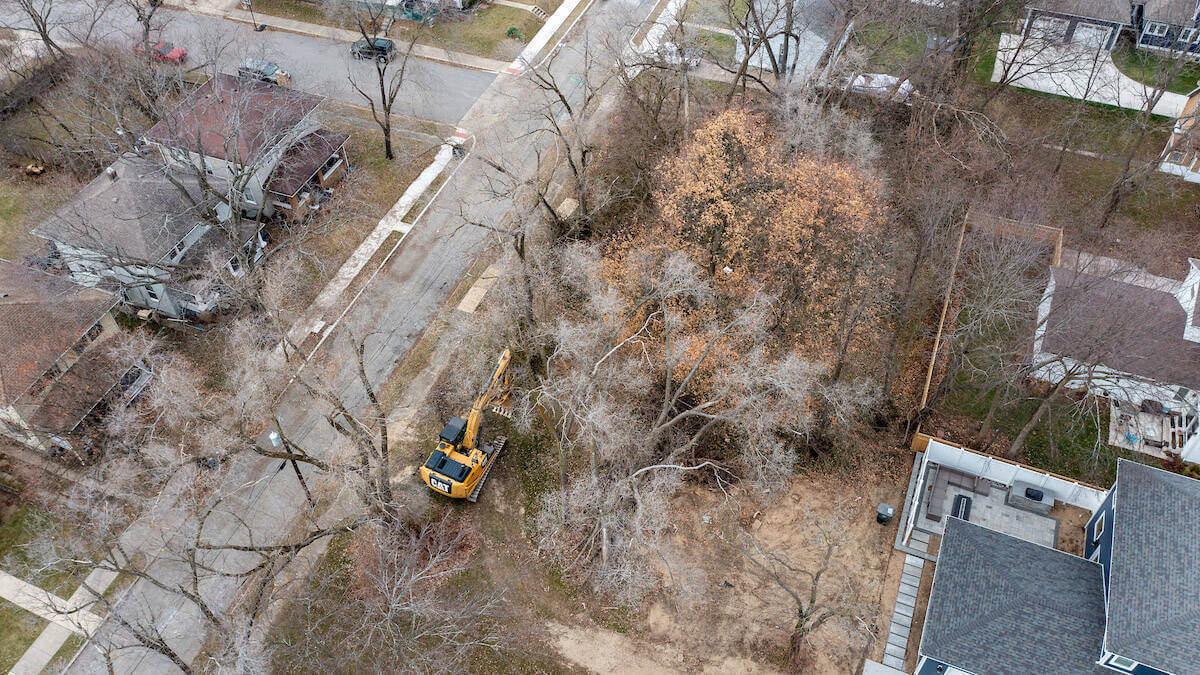
The University of Notre Dame is joining with Habitat for Humanity of St. Joseph County to build as many as seven new homes over the next five years, all in or near the increasingly popular Northeast Neighborhood south of campus, within walking distance to downtown South Bend, the East Bank and Eddy Street Commons.
The University recently donated four lots to Habitat along Turnock Street, about six blocks south of campus. It also donated $250,000 to the organization — $50,000 per year for five years — to build new homes there and elsewhere in the area for low- to moderate-income families who meet income and credit guidelines and agree to certain conditions for down payment and lending assistance through Habitat, which operates in more than 70 countries.
Habitat will soon host information sessions for people interested in building a Habitat home in or near the Northeast Neighborhood or in Mishawaka. Notre Dame employees are encouraged to attend the sessions. Meeting dates have not been announced.
“For 20 years, Notre Dame has carefully and continuously supported efforts to redevelop the Northeast Neighborhood as a founding member of the Northeast Neighborhood Revitalization Organization (NNRO). In 2020, in response to the pandemic and other economic challenges, as well as the changing needs of residents, the NNRO developed a broader vision for the organization, focused on direct assistance to residents and a deeper commitment to preserve and enhance access to affordable single-family housing,” said Tim Sexton, associate vice president for public affairs at Notre Dame and NNRO board president. “This partnership with Habitat is an important step in the realization of that vision. We want to thank the leadership at Habitat for their patience in working with us through the many details of the project, and for their ongoing commitment to responsible and affordable homeownership and community building throughout St. Joseph County.”
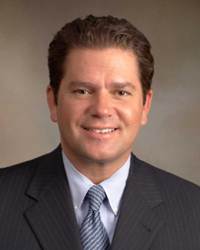
Situated on the east side of Turnock, the donated lots represent land acquired over time by Notre Dame as part of an ongoing effort, along with the city of South Bend and other public and private stakeholders, to facilitate new single-family home construction in the Northeast Neighborhood and reverse years of neglect and decline there. The money is a gift from a Notre Dame alumnus with a passion for both the University and Habitat.
As proposed, Habitat will build as many as four homes along Turnock over the next two years: Two in collaboration with the Notre Dame Alumni Association and its annual Family Volunteer Camp, a weeklong service and family fun camp for alumni, friends and family, and two with the Notre Dame Student Chapter of Habitat for Humanity, which organizes its own Habitat build each year. Conversations remain ongoing with the student chapter about the level of its involvement.
The organization will build an additional three homes — one per year — after that on Habitat-owned land, also with the Family Volunteer Camp.
Dolly Duffy is the executive director of the Alumni Association.
“Family Volunteer Camp has had a deep and lasting impact on the South Bend region,” Duffy said. “We couldn’t be more thrilled that families who have been inspired by their time serving here now have a chance to give back in a truly lasting way to other families as we seek to increase access to fair and equitable housing in our local community.”
“Habitat for Humanity is needed now more than ever. Builders today are simply not building entry-level homes ... So anybody looking for a quality, affordable but modest home just can’t find it."
Design-wise, the homes will reflect the work of the School of Architecture, which engages students to design local Habitat homes as part of a design course led by associate professor of the practice John Mellor, or the city of South Bend, which maintains a set of free, pre-approved building plans for individuals and developers who want to build in the city. The city’s plans, which include both single- and multi-family options, were developed with technical assistance from Notre Dame Center for Civic Innovation interns.
The city of South Bend also offers up to $20,000 in utility reimbursement costs as part of its Sewer Lateral Reimbursement Program for low- to moderate-income infill housing projects in the city.
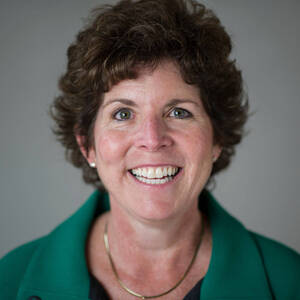
Architecture students have designed more than 20 new house concepts in the last two years as part of their study of affordable housing. Working in teams, students developed construction drawings for six of these homes, two of which have been built as part of a five-year agreement with Habitat. Work on the next series of designs is already underway. Students have the option to take an additional elective course, also led by Mellor, on the history and practice of affordable home construction — both here in South Bend and around the country. Both courses allow students to volunteer with Habitat in the construction of their own design work.
“Our partnership with Habitat for Humanity helps our students become better designers while helping Habitat increase the variety and character of the homes they offer without sacrificing affordability,” Mellor said, adding, “It is a difficult challenge, but the creativity of our students has me excited about the potential of this partnership.”
For Habitat, at least, the partnership is part of an ongoing effort to increase access to affordable housing for people of low- to moderate-income who have been priced out of the housing market in recent years because of rising real estate prices and narrow access to lending.
“Habitat for Humanity is needed now more than ever,” said Jim Williams, president and CEO of Habitat for Humanity of St. Joseph County. “Builders today are simply not building entry-level homes; for-profit builders don’t make enough money building entry-level homes. So anybody looking for a quality, affordable but modest home just can’t find it,” he said, precluding many from the advantages of homeownership as a source of personal and intergenerational wealth building.
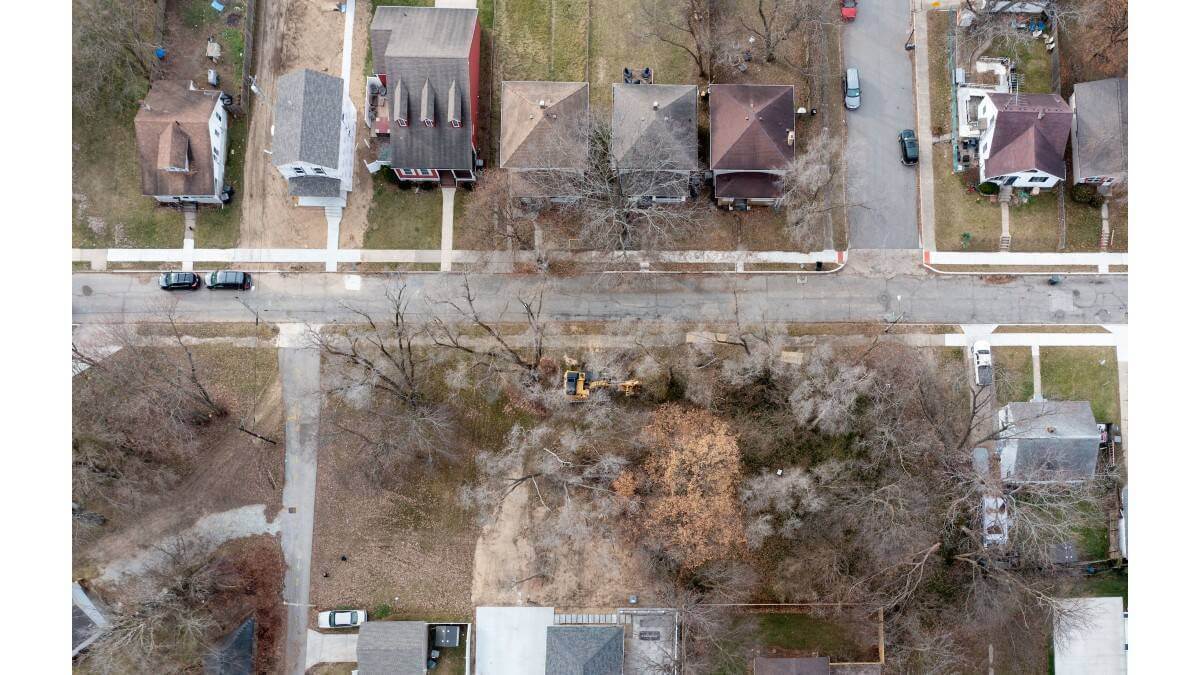
The relationship between Notre Dame and Habitat dates back many years, involving the student chapter of Habitat for Humanity and other such partnerships as well as one-off projects such as the Carter Work Project in Mishawaka.
Still, this newest project is distinctive in many respects, according to Jim Williams, president and CEO of Habitat for Humanity of St. Joseph County.
“What makes it unique is that so many constituencies are involved,” said Williams. “The houses will be designed by the Notre Dame School of Architecture, we’re going to have a relationship with the Alumni Association and the Family Volunteer Camp, and it will also involve Notre Dame students. So it’s very unique to see so many facets of the University come together in this way.”
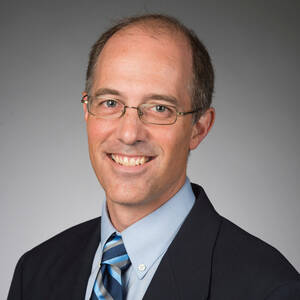
Habitat for Humanity is a nonprofit organization that provides affordable housing to people who need it. Participating families work alongside volunteers to build their own homes. They also volunteer for Habitat and participate in Habitat-sponsored homeownership classes. In doing so, they qualify for down payment assistance and favorable lending terms through Habitat.
Generally speaking, families pay no more than 30 percent of their income toward their mortgage, including property taxes and insurance. Habitat covers the remainder with grants and a zero-interest “soft” second mortgage. The second mortgage only has to be repaid if the homeowner sells or refinances the home.
Among other things, this guarantees affordability across a range of neighborhoods.
“The second mortgage is really what makes it all happen,” Williams said. “It gives families the opportunity to live in a location that they otherwise would not be able to afford.”
Habitat also places restrictions on the re-sale of homes to ensure they remain affordable and available to low- to moderate-income buyers into the future.
Located directly south of campus, the Northeast Neighborhood has grown by leaps and bounds over the past two decades, the result of ongoing redevelopment efforts there on the part of Notre Dame and others, including Kite Realty, the city of South Bend, the Northeast Neighborhood Revitalization Organization, South Bend Heritage Foundation and the Northeast Neighborhood Council.
Notre Dame, for its part, has pursued a combination of mixed-use and single-family development, with a focus on continued access to affordable housing. With respect to the latter, it has supported a variety of projects over the years, both in collaboration with South Bend Heritage Foundation and as a founding member of the NNRO, providing opportunities for dozens of low- to moderate-income buyers to plant roots in the area and build wealth. This includes a third of the homes in the Triangle Neighborhood, east of Eddy Street Commons, and a growing number along Hill Street, closer to the East Bank.
Looking ahead, the University hopes to develop even more affordable housing along Turnock, where it owns additional property next to the Habitat lots — possibly in collaboration with the NNRO, which is acquiring land for redevelopment in the area as part of a new community land trust.
For more information or to apply for a Habitat home, call 574-288-6967 or visit www.hfhsjc.org.
The University of Notre Dame is joining with Habitat for Humanity of St. Joseph County to build as many as seven new homes over the next five years, all in or near the increasingly popular Northeast Neighborhood south of campus, within walking distance to downtown South Bend, the East Bank and Eddy Street Commons.
The University recently donated four lots to Habitat along Turnock Street, about six blocks south of campus. It also donated $250,000 to the organization — $50,000 per year for five years — to build new homes there and elsewhere in the area for low- to moderate-income families who meet income and credit guidelines and agree to certain conditions for down payment and lending assistance through Habitat, which operates in more than 70 countries.
Habitat will soon host information sessions for people interested in building a Habitat home in or near the Northeast Neighborhood or in Mishawaka. Notre Dame employees are encouraged to attend the sessions. Meeting dates have not been announced.
“For 20 years, Notre Dame has carefully and continuously supported efforts to redevelop the Northeast Neighborhood as a founding member of the Northeast Neighborhood Revitalization Organization (NNRO). In 2020, in response to the pandemic and other economic challenges, as well as the changing needs of residents, the NNRO developed a broader vision for the organization, focused on direct assistance to residents and a deeper commitment to preserve and enhance access to affordable single-family housing,” said Tim Sexton, associate vice president for public affairs at Notre Dame and NNRO board president. “This partnership with Habitat is an important step in the realization of that vision. We want to thank the leadership at Habitat for their patience in working with us through the many details of the project, and for their ongoing commitment to responsible and affordable homeownership and community building throughout St. Joseph County.”
Situated on the east side of Turnock, the donated lots represent land acquired over time by Notre Dame as part of an ongoing effort, along with the city of South Bend and other public and private stakeholders, to facilitate new single-family home construction in the Northeast Neighborhood and reverse years of neglect and decline there. The money is a gift from a Notre Dame alumnus with a passion for both the University and Habitat.
As proposed, Habitat will build as many as four homes along Turnock over the next two years: Two in collaboration with the Notre Dame Alumni Association and its annual Family Volunteer Camp, a weeklong service and family fun camp for alumni, friends and family, and two with the Notre Dame Student Chapter of Habitat for Humanity, which organizes its own Habitat build each year. Conversations remain ongoing with the student chapter about the level of its involvement.
The organization will build an additional three homes — one per year — after that on Habitat-owned land, also with the Family Volunteer Camp.
Dolly Duffy is the executive director of the Alumni Association.
“Family Volunteer Camp has had a deep and lasting impact on the South Bend region,” Duffy said. “We couldn’t be more thrilled that families who have been inspired by their time serving here now have a chance to give back in a truly lasting way to other families as we seek to increase access to fair and equitable housing in our local community.”
“Habitat for Humanity is needed now more than ever. Builders today are simply not building entry-level homes ... So anybody looking for a quality, affordable but modest home just can’t find it."
Design-wise, the homes will reflect the work of the School of Architecture, which engages students to design local Habitat homes as part of a design course led by associate professor of the practice John Mellor, or the city of South Bend, which maintains a set of free, pre-approved building plans for individuals and developers who want to build in the city. The city’s plans, which include both single- and multi-family options, were developed with technical assistance from Notre Dame Center for Civic Innovation interns.
The city of South Bend also offers up to $20,000 in utility reimbursement costs as part of its Sewer Lateral Reimbursement Program for low- to moderate-income infill housing projects in the city.
Architecture students have designed more than 20 new house concepts in the last two years as part of their study of affordable housing. Working in teams, students developed construction drawings for six of these homes, two of which have been built as part of a five-year agreement with Habitat. Work on the next series of designs is already underway. Students have the option to take an additional elective course, also led by Mellor, on the history and practice of affordable home construction — both here in South Bend and around the country. Both courses allow students to volunteer with Habitat in the construction of their own design work.
“Our partnership with Habitat for Humanity helps our students become better designers while helping Habitat increase the variety and character of the homes they offer without sacrificing affordability,” Mellor said, adding, “It is a difficult challenge, but the creativity of our students has me excited about the potential of this partnership.”
For Habitat, at least, the partnership is part of an ongoing effort to increase access to affordable housing for people of low- to moderate-income who have been priced out of the housing market in recent years because of rising real estate prices and narrow access to lending.
“Habitat for Humanity is needed now more than ever,” said Jim Williams, president and CEO of Habitat for Humanity of St. Joseph County. “Builders today are simply not building entry-level homes; for-profit builders don’t make enough money building entry-level homes. So anybody looking for a quality, affordable but modest home just can’t find it,” he said, precluding many from the advantages of homeownership as a source of personal and intergenerational wealth building.
Property donated by The University of Notre Dame to Habitat for Humanity of St. Joseph along Turnock Street in South Bend, just south of campus.
The relationship between Notre Dame and Habitat dates back many years, involving the student chapter of Habitat for Humanity and other such partnerships as well as one-off projects such as the Carter Work Project in Mishawaka.
Still, this newest project is distinctive in many respects, according to Jim Williams, president and CEO of Habitat for Humanity of St. Joseph County.
“What makes it unique is that so many constituencies are involved,” said Williams. “The houses will be designed by the Notre Dame School of Architecture, we’re going to have a relationship with the Alumni Association and the Family Volunteer Camp, and it will also involve Notre Dame students. So it’s very unique to see so many facets of the University come together in this way.”
Habitat for Humanity is a nonprofit organization that provides affordable housing to people who need it. Participating families work alongside volunteers to build their own homes. They also volunteer for Habitat and participate in Habitat-sponsored homeownership classes. In doing so, they qualify for down payment assistance and favorable lending terms through Habitat.
Generally speaking, families pay no more than 30 percent of their income toward their mortgage, including property taxes and insurance. Habitat covers the remainder with grants and a zero-interest “soft” second mortgage. The second mortgage only has to be repaid if the homeowner sells or refinances the home.
Among other things, this guarantees affordability across a range of neighborhoods.
“The second mortgage is really what makes it all happen,” Williams said. “It gives families the opportunity to live in a location that they otherwise would not be able to afford.”
Habitat also places restrictions on the re-sale of homes to ensure they remain affordable and available to low- to moderate-income buyers into the future.
Located directly south of campus, the Northeast Neighborhood has grown by leaps and bounds over the past two decades, the result of ongoing redevelopment efforts there on the part of Notre Dame and others, including Kite Realty, the city of South Bend, the Northeast Neighborhood Revitalization Organization, South Bend Heritage Foundation and the Northeast Neighborhood Council.
Notre Dame, for its part, has pursued a combination of mixed-use and single-family development, with a focus on continued access to affordable housing. With respect to the latter, it has supported a variety of projects over the years, both in collaboration with South Bend Heritage Foundation and as a founding member of the NNRO, providing opportunities for dozens of low- to moderate-income buyers to plant roots in the area and build wealth. This includes a third of the homes in the Triangle Neighborhood, east of Eddy Street Commons, and a growing number along Hill Street, closer to the East Bank.
Looking ahead, the University hopes to develop even more affordable housing along Turnock, where it owns additional property next to the Habitat lots — possibly in collaboration with the NNRO, which is acquiring land for redevelopment in the area as part of a new community land trust.
For more information or to apply for a Habitat home, call 574-288-6967 or visit www.hfhsjc.org.
Originally published by at news.nd.edu on January 31, 2023.
